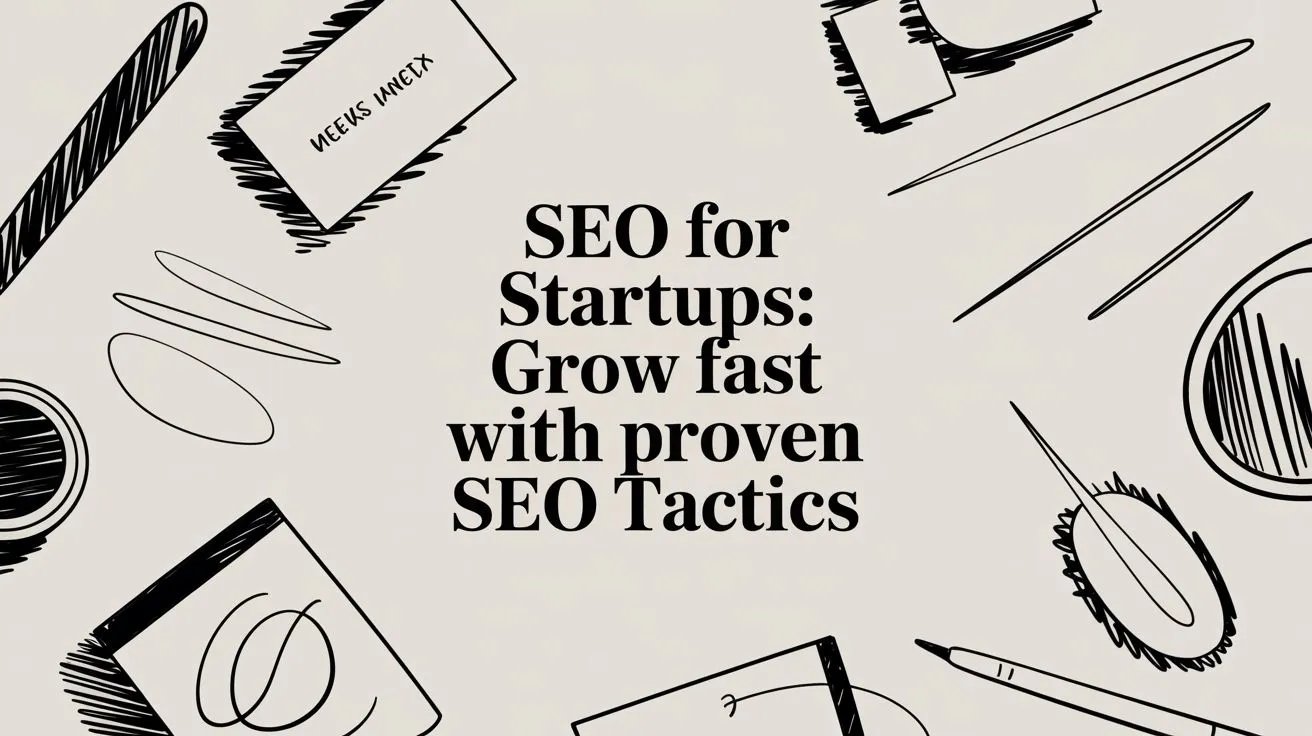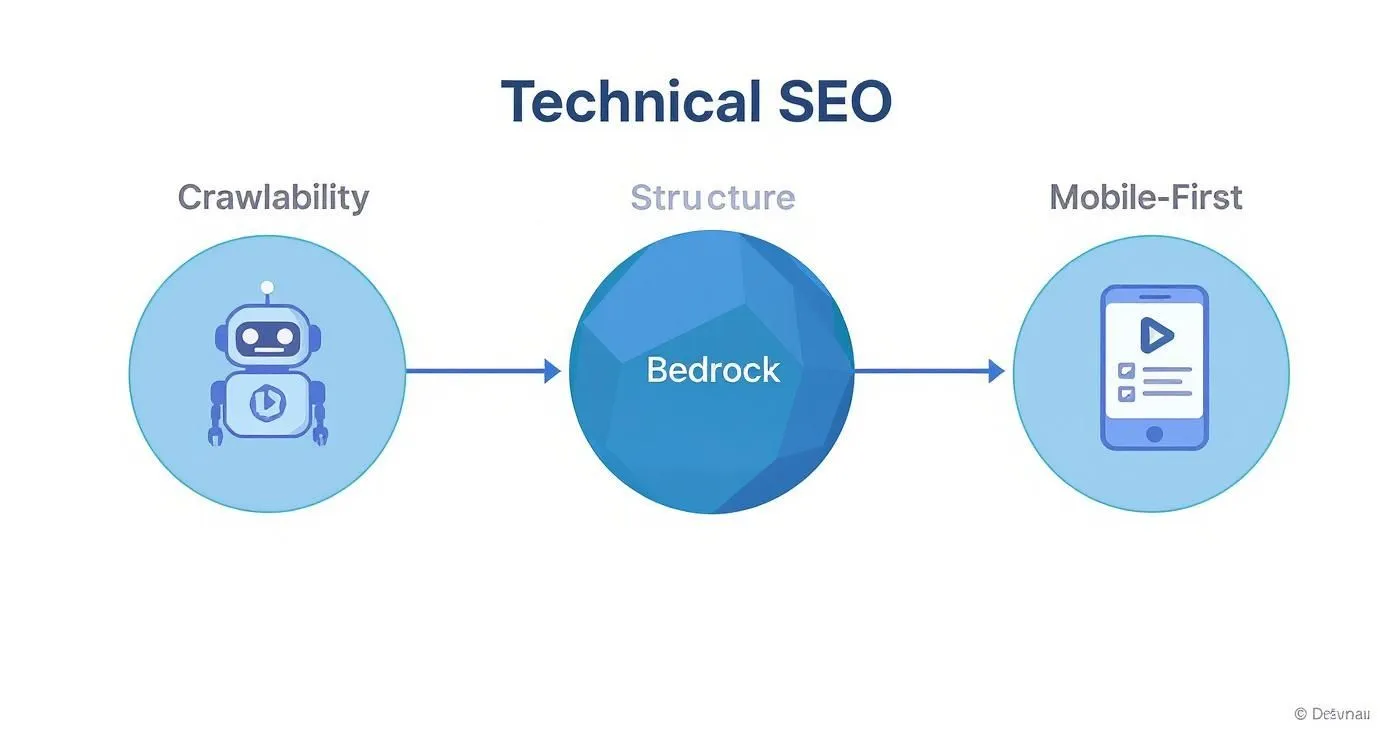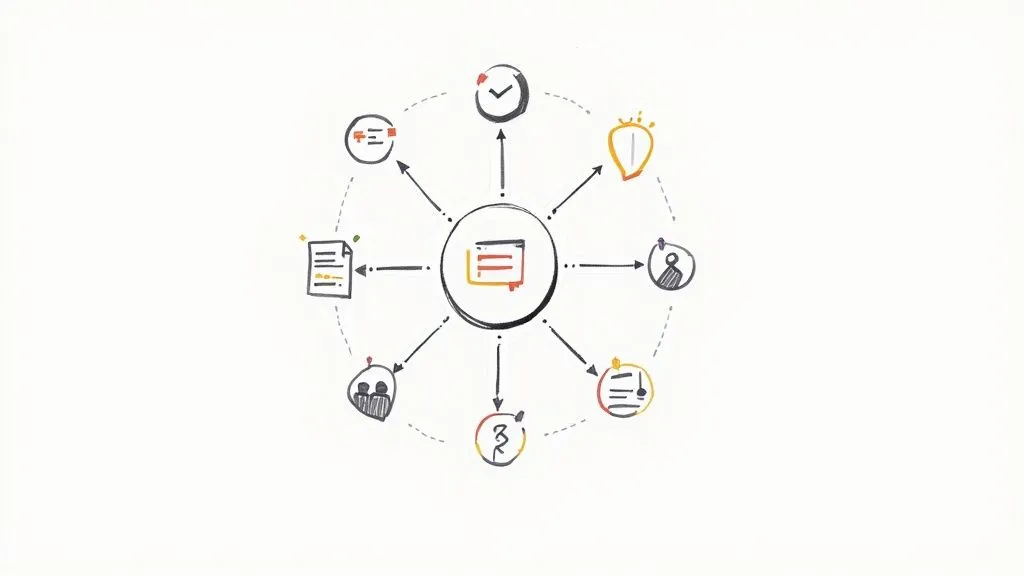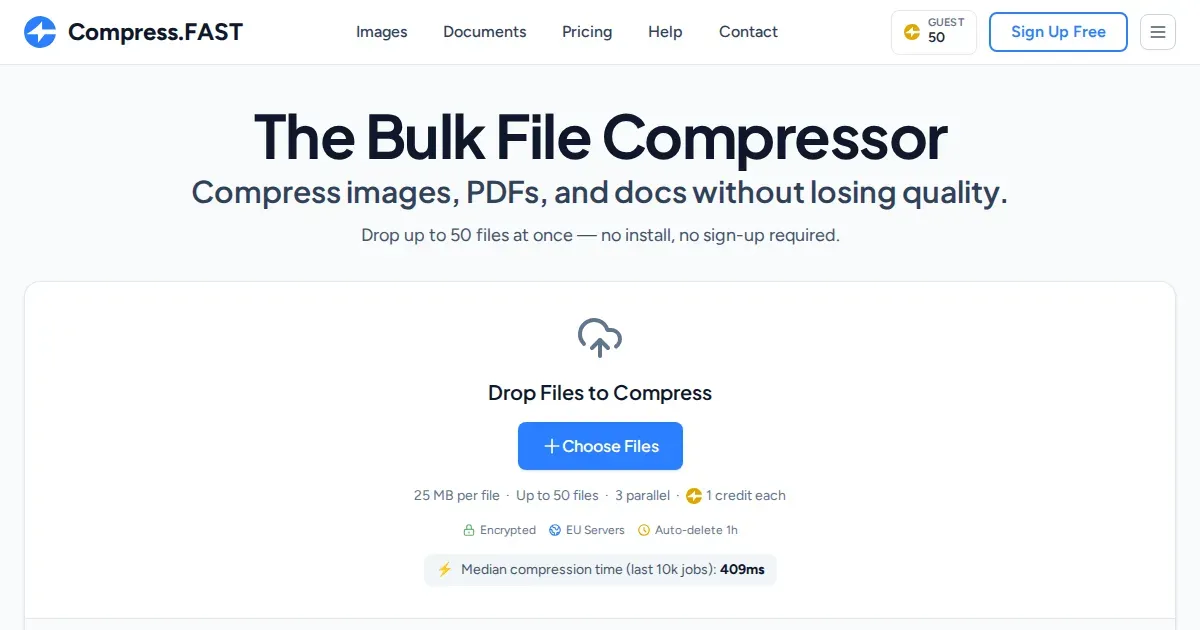SEO for Startups: Grow Fast with Proven SEO Tactics
SEO for startups: Discover practical, scalable SEO strategies to boost rankings, traffic, and sustainable growth.

SEo for Startups: Grow Fast with Proven SEO Tactics
SEO for startups is all about optimizing your website to pull in high-intent customers from search engines like Google. For a new venture, it’s hands-down the most powerful way to build a customer acquisition channel that actually grows over time. Think of it this way: paid ads are like a faucet—the leads stop the second you stop paying. SEO is an asset that keeps delivering.
Why SEO Is Your Startup's Ultimate Growth Engine

So many startups fall into the trap of paying for every single click. It's a constant, draining expense, like having to buy your electricity one day at a time. SEO is completely different. It's more like building a hydroelectric dam: there's a real upfront investment of time and strategy, but once that dam is built, it generates a powerful, continuous stream of valuable traffic for years.
And this isn't just any traffic. These are potential customers actively hunting for the exact solution you're offering. While ads can feel like an interruption, a top search result feels earned and authoritative. Ranking organically builds a kind of trust that paid campaigns just can't buy, making your brand the go-to choice in your niche.
The Compounding Value of an Organic Presence
Here’s the best part. Unlike a paid ad that vanishes when the budget runs out, every piece of content you create and every backlink you earn becomes a lasting asset. A single, well-optimized blog post can keep attracting qualified leads for months or even years, turning a one-time effort into a perpetual growth machine.
This is a huge deal when you realize that over 53% of all website traffic comes from organic search. For any startup trying to scale efficiently, ignoring this channel is like leaving the majority of your potential customers on the table.
A Practical Roadmap to Startup SEO Success
This guide is your end-to-end playbook. We’re going to walk through everything from the foundational concepts to the advanced tactics you'll need to win. By focusing on a solid SEO strategy from day one, you build a resilient acquisition channel that will support your company at every stage of its growth. It’s a core piece of any durable launch plan, essential for launching a new product for lasting success.
Getting your SEO priorities straight from the beginning is key. This table breaks down what you absolutely need to focus on to see both immediate and long-term results.
Startup SEO Priorities for Maximum Impact
| SEO Pillar | Why It Matters for Startups | First Actionable Step |
|---|---|---|
| Strategy Development | You can't hit a target you can't see. Strategy ensures you're chasing keywords that actually convert, not just vanity metrics. | Identify 5-10 "bottom of the funnel" keywords your ideal customer would use right before buying. |
| Technical Setup | A technically sound site is the foundation. Without it, even the best content won't get seen by Google. | Run your site through Google's PageSpeed Insights and fix any "Core Web Vitals" errors. |
| Content Planning | Content is how you attract and earn trust from your audience. It's your 24/7 salesperson. | Outline one in-depth blog post that solves a major pain point for your target customer. |
| Link Building | Backlinks are votes of confidence from other sites. They are a primary driver of authority and rankings. | Find 10 relevant startup directories and create a complete, compelling profile for your company. |
With these pillars in mind, you're not just "doing SEO"—you're building a strategic asset.
Here’s a sneak peek at what we'll cover to build your foundation:
- Strategy Development: How to find high-intent keywords and spot the gaps your competitors are missing.
- Technical Setup: Making sure your website is built from the ground up for search engine visibility.
- Content Planning: Creating resources that don't just attract your ideal users but also convert them.
- Link Building: Earning the authority signals that boost your credibility and send your rankings soaring.
Crafting Your Startup's SEO Blueprint
A solid SEO strategy doesn’t start with code or content. It starts with your customer. Before you can win on Google, you have to win inside the mind of your ideal user. The goal here is to build a simple blueprint that becomes the true north for every marketing decision you make.
Forget chasing high-volume, generic keywords. For a startup with limited resources, that’s a losing fight against the big guys who have been at it for years. Your game is precision. You need to identify the specific problems, pains, and questions your target audience is typing into the search bar right now. This is the heart of SEO for startups: finding that perfect intersection of customer intent and your solution.
Identify Your Ideal Customer's Deepest Pains
First things first: get a crystal-clear picture of who you're serving. Don't just think about job titles or company sizes. Dig into the real-world frustrations that keep your ideal customers up at night. What’s driving them crazy? What problems are they desperate to solve?
- Pain Point: "Our remote team's communication is just a chaotic mess."
- Pain Point: "We're burning hours manually tracking project updates in spreadsheets."
- Pain Point: "I have zero visibility into what my team is actually working on."
Each of these pain points is a breadcrumb. It leads you directly to search queries from people who are ready to act. Someone searching "best project management software" is just window shopping. But a person searching "how to fix chaotic remote team communication" is feeling the pain and actively looking for a cure—your solution.
Translate Problems into High-Intent Keywords
Once you’ve listed out the core pain points, it's time to translate them into the language your customers actually use. This isn't about firing up a technical keyword research tool (not yet, anyway). It's more about empathy. What exact phrases would someone use when they know they have a problem but don’t know your brand exists?
The sweet spot for startup SEO is targeting 'problem-aware' keywords. These are queries from people who know they have an issue but haven't found the tools to fix it yet. This is your opening to join the conversation and become their guide.
Let’s say you’ve built a project management tool. Your targets might look like this:
- "tools for remote team collaboration"
- "how to improve project visibility for managers"
- "spreadsheet alternative for project tracking"
These are long-tail keywords. They get fewer searches, sure, but the traffic they bring in is far more qualified. Each person searching is signaling a specific need your product was built for, making them much, much more likely to convert.
Conduct Lean Competitor Analysis to Find Your Niche
You don’t need fancy, expensive software to figure out who you’re up against. Just start Googling your target "problem-aware" keywords. Look at the top-ranking results and ask yourself a few critical questions:
- Who is Ranking? Are they massive corporations, media sites, or other startups like you? This gives you a quick read on how tough the competition will be.
- What Type of Content is Winning? Are the top results blog posts, landing pages, free tools, or videos? This shows you what Google thinks is the best answer for that search.
- Where are the Gaps? Look for weaknesses. Is the top content outdated? Does it lack real-world examples? Is it poorly written or just plain boring?
This quick-and-dirty analysis isn't about copying what they’re doing. It’s about finding opportunities to create something 10x better. If the top article is a generic list, you can create a comprehensive guide with video tutorials. If it's a dry, corporate page, you can write a relatable case study that actually tells a story.
By mapping customer pains to high-intent keywords and spotting strategic gaps in the search results, you create an SEO blueprint you can actually use. This roadmap makes sure every piece of content you create has a purpose, aligns with your business goals, and uses your startup’s limited resources to get real, meaningful results.
Building a Rock-Solid Technical SEO Foundation
Let’s be honest: Technical SEO isn't the glamorous part of building a startup. It's the plumbing. You don't show it off to investors, but if it’s broken, your entire marketing strategy will spring a massive leak. Think of it like building a new retail store—you need a clear entrance, bright lights, and well-marked aisles. Without those basics, the best products in the world will just gather dust.
Getting the technical side right from day one saves you from giant headaches down the road. It’s all about making sure search engines like Google can easily find, crawl, and understand what your site is about. This isn't about becoming a coding expert; it’s about a handful of non-negotiables that set you up for success.
Make Your Website Easy to Crawl and Index
Before Google can rank you, its bots—often called "spiders"—need to be able to access and read your pages. This is called crawling and indexing. A couple of simple files on your site act as the traffic signals for these bots, telling them where to go and what to look at.
- Robots.txt: This is just a plain text file that gives search engine bots instructions. It tells them which pages to ignore, like internal admin dashboards or thank-you pages that have no value for searchers.
- XML Sitemap: This is exactly what it sounds like—a map of your website. It lists all the important pages you want search engines to find. Submitting this map directly to Google Search Console is like handing the bots a guide to your site, ensuring they don’t miss any of your great content.
This screenshot from Google’s own docs shows how a sitemap is just a clean list of your URLs. No magic here.
It’s a simple, organized way to tell crawlers exactly what you want them to see and index.
Implement a Logical and Scalable Site Structure
A messy website confuses everyone—users and search engines alike. A clean, logical structure helps spread your SEO authority (often called "link equity") throughout your site and makes it dead simple for people to find what they're looking for. Imagine a library with no Dewey Decimal System. Chaos. Your site needs that same sense of order.
For most startups, a simple hierarchy works best:
- Homepage: The main hub, linking to all your big-picture sections.
- Category Pages: Broad topics like "Features," "Pricing," or "Solutions."
- Detail Pages: Specific feature pages or blog posts that live under a main category.
This tiered approach keeps related content grouped together. For instance, all your blog posts about "team collaboration" should link to each other, which helps signal to Google that you’re an authority on that topic. This small bit of organization makes your SEO for startups efforts far more effective.
A well-planned site structure is your secret weapon for building topical authority. It tells Google you have deep expertise in your niche—a massive advantage when you’re the new kid on the block.
Prioritize Mobile-First Indexing and Page Speed
We live in a mobile world. Google now primarily uses the mobile version of a website for indexing and ranking. They call it mobile-first indexing. If your site is gorgeous on a desktop but a slow, broken mess on a phone, your rankings will tank. A responsive design that just works on any screen isn't a "nice-to-have" anymore; it's table stakes.
Page speed is just as critical. A Google study found that a one-second delay in mobile load times can slash conversion rates by up to 20%. People are impatient, and so are search engines. Use a free tool like Google's PageSpeed Insights to check your site's performance and fix whatever is slowing it down.
Secure Your Site with HTTPS
Last but not least, get that little padlock icon in the address bar. An SSL certificate (which enables HTTPS) encrypts the connection between your website and your visitors, keeping their information safe. Today, browsers flag sites without it as "Not Secure," which is an instant trust-killer for any potential customer.
Beyond the obvious security win, Google has confirmed that HTTPS is a small ranking signal. It’s a simple, foundational piece that shows both users and search engines you’re a legitimate business they can trust.
Creating Content That Attracts Your First 1000 Users
Okay, your technical foundation is solid. The website is primed and ready for visitors. Now, how do you actually get them to show up?
For a startup, content isn't about volume. Forget pumping out dozens of articles a week. It's about surgical precision. Every single piece you create needs to have a clear, strategic job to do.
This is where the Topic Cluster Model becomes a founder's best friend. Instead of writing random blog posts and hoping for the best, you build your authority in a very focused, deliberate way. Think of it like writing an entire book on a subject instead of a collection of disconnected short stories.
Dominate Your Niche with Topic Clusters
The model is simple on the surface but incredibly powerful in practice. You create one massive, in-depth resource—a "pillar page"—that covers a broad topic your customers desperately need to understand. Then, you surround it with shorter, more specific "cluster" articles that dive deep into one specific question related to that pillar.
- Pillar Page: This is your cornerstone. It’s something like a "Definitive Guide to Remote Team Collaboration." It’s the go-to resource, the big picture.
- Cluster Content: These are the supporting articles. They tackle very specific sub-topics, like "Best Tools for Asynchronous Communication" or "How to Run an Effective Virtual Meeting."
Every single cluster article links back to your main pillar page. This sends a huge signal to Google: you're not just casually mentioning this topic—you're an authority. This is a core strategy in SEO for startups because it lets you dominate a niche and build real credibility, even when your resources are tight.
By creating this interconnected web of content, you’re not just answering one-off questions. You’re building a comprehensive library that makes your brand the undeniable expert on a subject your customers care deeply about.
This model shows how everything in SEO works together. Without a solid technical base—crawlability, good structure, mobile-friendliness—even the most brilliant content will fall flat.

As the infographic makes clear, that technical groundwork is completely non-negotiable. Get that right, and your content has a fighting chance to rank and bring in traffic.
Mapping Content to the User Journey
To make your topic clusters work even harder, you need to meet people where they are. Your content should act as a guide, leading potential customers from the moment they realize they have a problem all the way to choosing your solution.
Let's break down the three main stages people go through:
- Awareness (Top of the Funnel): People know they have a problem, but they don't know your solution exists yet. They're typing broad, informational questions into Google.
- Consideration (Middle of the Funnel): Now they’re actively researching options. They're looking for comparisons, guides, and specific ways to solve their problem.
- Decision (Bottom of the Funnel): They're ready to buy. They're searching for pricing, case studies, and proof that your product is the right one.
Practical Content Ideas for Each Stage
When you create content for each stage, you have an answer ready for every question a potential customer might ask.
For the Awareness Stage: Here, your job is to educate. You want to attract a wide audience with "how-to" guides, checklists, and informational posts that don't push your product.
- Example Topic: "10 Signs Your Team's Communication Is Broken"
- Example Topic: "What Is Asynchronous Communication and Why It Matters"
For the Consideration Stage: This is where you start to show how your product solves their problem better than anyone else. Think comparisons, webinars, and detailed use cases.
- Example Topic: "Our Software vs. Slack for Deep Work"
- Example Topic: "How [Customer Company] Reduced Meetings by 40% with Our Tool"
A killer tactic for startups at this stage is to engage directly in communities where your potential users are already talking about their problems. Answering questions on places like Reddit builds incredible trust. To see how it's done right, check out this guide on how to launch a startup on Reddit, which is all about authentic community engagement.
For the Decision Stage: Time to close the deal. This content needs to be laser-focused on your product's value. We're talking case studies, demo videos, and crystal-clear pricing pages.
- Example Topic: "A Detailed Walkthrough of Our Project Management Features"
- Example Topic: "Why [Your Brand] Is the Best Trello Alternative for Agencies"
By planning your content around topic clusters and the user journey, you stop throwing spaghetti at the wall. Every piece you publish has a purpose. It all works together to build your authority, attract your ideal customers, and systematically turn strangers into your first 1000 loyal users.
Acquiring High-Value Links and Authority Signals

If your content is the engine, high-quality links are the fuel. In SEO, links from other respected websites act as powerful votes of confidence. They signal to search engines that your brand is trustworthy and deserves a top spot. For a new venture, earning this trust is everything.
A lot of founders assume link building requires a huge budget or a fancy PR firm. But the truth is, the most effective strategies for a startup are often scrappy and smart, powered by the expertise you already have. The goal isn't just to get thousands of random links; it's to build a strong, relevant portfolio of backlinks that signals your authority.
Start with Foundational Directory Listings
The absolute lowest-hanging fruit for any new company is getting listed in relevant, high-authority directories. These platforms are often the first place potential customers, investors, and even journalists look to discover new businesses. Securing these listings is a straightforward way to earn your first quality backlinks and establish a digital footprint.
Think of these directories as the modern Yellow Pages, but with a serious SEO kick. Every listing creates a citation and a link back to your site—foundational signals that build your authority from the ground up.
Getting listed on established startup platforms does more than just provide a backlink. It validates your existence to both search engines and early adopters, building a base layer of credibility that you can scale from.
Focus on platforms that are well-respected in the tech and startup community. Here are the essential categories to hit first:
- General Startup Platforms: Sites like Product Hunt, BetaList, and Crunchbase are non-negotiable for early visibility.
- Industry-Specific Directories: Find the directories that live and breathe your niche, whether it's FinTech, HealthTech, or B2B SaaS. A link from a relevant industry source carries far more weight.
- Review Sites: For software startups, platforms like G2 and Capterra are critical. They provide both powerful links and the social proof that buyers crave.
Getting these foundational links is a key first step. For a curated list to get you moving, check out some of the top dofollow directories for SEO backlinks that offer genuine authority.
High-Impact Link Building Tactics for Startups
Not all link-building tactics are created equal, especially when you're short on time and resources. This table breaks down a few high-impact strategies, weighing the effort, cost, and potential payoff for a new startup.
| Tactic | Effort Level | Typical Cost | Potential Impact |
|---|---|---|---|
| Startup Directories | Low | Free to Low | Medium |
| Guest Posting | Medium | Low (Time) | High |
| Free Tools | High | Medium (Dev Time) | Very High |
| Original Data/Surveys | Medium | Low | High |
| Podcast Interviews | Medium | Low (Time) | Medium |
While directories are the perfect starting point, combining them with guest posts and one unique "linkable asset" can create a powerful, self-sustaining authority engine for your startup.
Turn Your Founder Expertise into Guest Posts
As a founder, you have unique insights into the problems your startup solves. This expertise is one of your most valuable link-building assets. Guest posting on relevant industry blogs lets you tap into a pre-built audience, share your knowledge, and earn a powerful backlink in the process.
This isn't about churning out generic articles for any blog that will take them. The key is strategic placement. Find the blogs your ideal customers already read and trust. Pitch them a topic that hits a specific pain point and showcases your unique perspective—without being a sales pitch. A single, well-placed guest post on a respected site can drive more qualified traffic than a dozen low-quality links combined.
Create Link-Worthy Assets
The most sustainable link-building strategy is to create something on your own site that people can't help but link to. We call these "link-worthy assets," and they don't have to be complicated. The idea is to offer such undeniable value that others in your industry will want to share it with their own audiences.
Here are a few simple but effective ideas for startups:
- A Simple, Free Tool: Can you build a basic calculator, checklist generator, or template that solves a small but nagging problem for your audience? Free tools are absolute link magnets.
- Unique Data or Insights: Even a small-scale survey of your first 50 customers can produce a unique statistic that bloggers and journalists will cite and link back to for years.
- A Definitive Guide: Create the single best, most thorough resource on a specific, niche topic. If your guide is genuinely more helpful than anything else out there, it will naturally attract links over time.
By focusing on these scrappy yet high-impact tactics, your SEO for startups strategy can build the authority it needs to compete, turning backlinks into a true engine for growth.
Scaling Growth with International SEO
Most startups are global from day one, but their SEO is often stuck in a single language. This is a huge missed opportunity. Thinking beyond English-speaking countries isn't just a clever growth hack—it's how you unlock entirely new revenue streams and build a brand that feels truly international.
Think of international SEO as building bridges to new continents. Just like you'd need translators and local guides for a physical expansion, you need the right technical signals and cultural savvy for a digital one. This isn't about simple translation; it's about genuine localization.
From Translation to True Localization
Localization is the art of making your message feel native to a specific market. A direct translation might be grammatically correct, but it will almost certainly miss the local idioms, cultural references, or buying triggers that make people connect with your brand.
True localization means understanding that a customer in Tokyo searches differently and has different expectations than a customer in Berlin. It's about showing each market you understand them on their own terms, which builds immense trust.
The data is pretty clear on this. An incredible 75% of users prefer buying in their native language, and localized content has been shown to boost organic traffic by up to 70%. With most of the world's searches happening in languages other than English, this is a massive lever for any startup trying to scale. You can discover more about how localization impacts search behavior and what that means for your bottom line.
Technical Setup for Global Reach
To make sure search engines show the right content to the right people, you need a few key technical pieces in place. The most important one is the hreflang tag.
It’s just a small piece of code in your website's header, but it does a critical job. It tells Google which language and regional version of a page to show to a user. For example, it specifies that someone searching from Germany should see your German-language page (de-DE), while someone from Spain gets the Spanish version (es-ES).
Getting hreflang tags right prevents messy duplicate content issues and creates a smooth user experience—a core part of any solid SEO for startups plan. Before you go all-in on a new market, use keyword research tools to see if there’s real demand. Look at the search volumes for what you do, but in different languages. This data-first approach lets you expand internationally with confidence, turning SEO into a predictable engine for global growth.
Common SEO Questions from Startup Founders
Look, I get it. When you're building a startup, time is your most precious resource. You've got a million questions about SEO and need straight answers, not a bunch of jargon. Let's tackle the big ones I hear from founders all the time.
How Long Until We See SEO Results?
This is always the first question, and for good reason. The honest answer? You'll start to see flickers of movement in a few months, but for real, needle-moving results, you need to think in terms of 6 to 12 months.
SEO isn't like flipping a switch; it’s more like planting a tree. The early work you do—nailing the technical stuff, creating your first pieces of genuinely helpful content—is building the foundation. That effort compounds, delivering growth long after a paid ad budget runs out.
SEO vs. Paid Ads: Which Is Better?
They’re different tools for different jobs. Paid ads are fantastic for getting immediate feedback and testing your message. SEO, on the other hand, is how you build a long-term, defensible asset.
Paid ads are like renting an audience—the traffic stops the second you stop paying. SEO is like buying the property—it takes time to build, but the asset and its returns are yours to keep.
A smart strategy uses both. Run paid ads to get that initial traction and learn what resonates. Meanwhile, invest in SEO to build the scalable, cost-effective growth engine that will carry you for years to come.
Can We Do SEO Ourselves?
Absolutely. In the early days, you should be doing it yourselves. A ton of foundational SEO is well within your grasp. We're talking about creating great content that solves a real problem for your audience, getting listed in startup directories, and handling the basics of on-page optimization.
Focus on being ridiculously helpful. If you do that, you're already halfway there.
As you grow, sure, you might bring in a specialist or an agency to handle the more complex, technical side of things. But starting with a founder-led approach is incredibly powerful. It ensures your SEO is baked into your business goals right from day one, not just bolted on as an afterthought.


